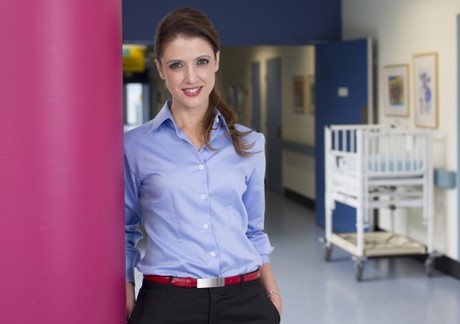UNSW medical psychology researcher wins Harkness Fellowship

UNSW Sydney medical psychology researcher Associate Professor Nadine Kasparian has won the 2018–19 Harkness Fellowship in Health Care Policy and Practice, allowing her to spend a year at Harvard Medical School and Boston Children’s Hospital.
Associate Professor Kasparian is the only Australian this year to be awarded the Fellowship, an opportunity that will see her extend her medical psychology program, which focuses on transforming mental health care for children with critical or chronic illness such as congenital heart disease.
The Fellowships were established by the US-based Commonwealth Fund and modelled on the Rhodes Scholarships. Up to 12 Fellowships are awarded each year, to health services researchers and practitioners from Australia, Canada, France, Germany, The Netherlands, New Zealand, Norway and the United Kingdom.
“This Fellowship represents an incredible opportunity for health professionals to work with exemplar centres in the US to develop health policy and practice innovations,” said Associate Professor Kasparian, who will begin her new role this week.
Based in Boston, and working closely with leading researchers from Harvard Medical School, Boston Children’s Hospital, Brigham and Women’s Hospital, Columbia University in New York and University of California in San Francisco (UCSF), she will analyse paediatric mental healthcare settings in the US, use big data sets to test differences in care, interview world-leading experts in the field, and develop a framework for better access to high-quality, cost-effective mental health care for children with chronic illness and their families.
“Diagnosis of a life-threatening condition during childhood can have profound emotional consequences,” said Associate Professor Kasparian. “Despite big advances, there are still important gaps in mental health care for these children and their families. Filling these gaps with innovative interventions can buffer the effects of chronic illness and make a lifetime of difference for a child.
“Exposure to the complex US and international health systems will help inform new models of mental health care for more than 65,000 Australians living with congenital heart disease, as well as offer guidance for similar services for other childhood illnesses.”
In 2010, Associate Professor Kasparian, who is also a recipient of the National Heart Foundation’s Future Leader Fellowship, worked in close partnership with The Sydney Children’s Hospitals Network to open the first psychology research program and clinical service dedicated to childhood heart disease.
Associate Professor Kasparian’s previous research has also identified parents’ preferences for new models of specialised paediatric cardiac genetics services, providing information about genetic and other risk factors associated with congenital heart disease.
She emphasised that about half of all babies with complex congenital heart disease are diagnosed during pregnancy and are currently not eligible for the NDIS.
“Our vision is to see high-quality mental health care implemented as part of ordinary, routine care for children with critical or chronic illness and their families. The opportunity to work at Harvard Medical School this year will undoubtedly accelerate our capacity to deliver the best possible outcomes to those who need it most.”
Associate Professor Kasparian’s hospital team has also recently received the 2018 SCHN Quality & Innovation Award for Excellence in the Provision of Mental Health Services, with the submission Cherishing Children with Heart Disease. Her team has since been nominated for a NSW Health Award, with outcomes to be announced soon.
argenx and Monash University partner against autoimmune diseases
To advance a pioneering molecule for autoimmune diseases, global immunology company argenx has...
Archer completes potassium sensing alpha prototype
Quantum technology company Archer Materials Limited has developed an early Biochip prototype...
Farm animals and aquaculture cryopreservation partnership announced
Vitrafy Life Sciences Limited has announced that it has entered a 12-month exclusive agreement...



